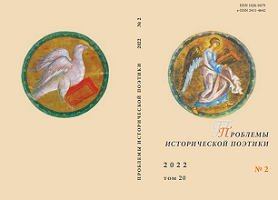Прозиметрические композиции в творчестве Виктора Пулькина
Prosimetrical Compositions in the Works of Viktor Pul’kin
Author(s): Alexander Mihailovich PetrovSubject(s): Customs / Folklore, Russian Literature, Sociology of Culture, Sociology of the arts, business, education, Theory of Literature
Published by: Петрозаводский государственный университет
Keywords: Viktor Pul’kin; prose; verse; study of verse; Russian literature; Russian folklore; prosimetrum; rayoshnik (rhyming verse);
Summary/Abstract: The article deals with the problem of prosimetry (prosimetrum) in a work of literary fiction. Viktor Pul’kin’s works in the literary tale genre (narration in the first person, or skaz) from “The Kizhi Stories,” “The Bronze Horseman,” and “The Royal Fingers” literary collections were analyzed. A hypothesis is put forward that Viktor Pul’kin’s works can be classified as prosimetrical compositions. Literary tales (skaz) are proven to be an important material for the study of prosimetry and are of particular interest for verse studies. The author discovers that Viktor Pul’kin relies on the spoken and chanted folk verse traditions. Various genres of Russian (and, in rare cases, Karelian) oral folk art act as sources of poetic elements in Viktor Pul’kin’s prose. These genres include proverbs, sayings, riddles, lyric songs, byline (heroic epics), spiritual verses, incantations, runes of the Kalevala metrics, etc. Prosaic fragments with increased rhythm were also discovered, specifically, these include constructions with syntactic parallelism and most often with grammatical rhyme, which cannot be conclusively qualified as poetic elements. An important aspect of the poetics of Viktor Pul’kin’s skaz is comprised by the experiments with folklore spoken verse, or the so-called rayoshnik. Such texts are numerous, but they almost never reach a significant length. At the same time, the rayoshnik occupies the intermediate place between verse and prose: usually the tales (skaz) written in rayoshnik are, strictly speaking, rhymed prose, rather than verse. This applies both to direct folklore quotations and to folklore and literary experiments. The article attempts to correlate the poetics of Viktor Pul’kin’s works with the poetics of the literary tale (skaz) genre as such. The presence of folklore poetic fragments in a prosaic text seems to be largely predetermined by the poetics of the literary tale (skaz), which is characterized by an orientation towards the “living” word, stereotypes of everyday speech, and the colloquialspeech basis of traditional popular culture.
Journal: Проблемы исторической поэтики
- Issue Year: 20/2022
- Issue No: 2
- Page Range: 406-424
- Page Count: 21
- Language: Russian

